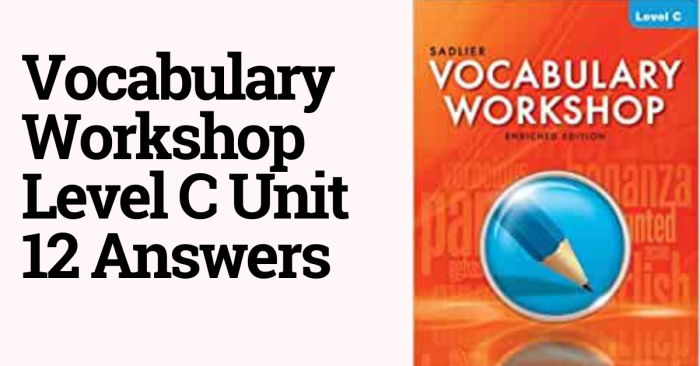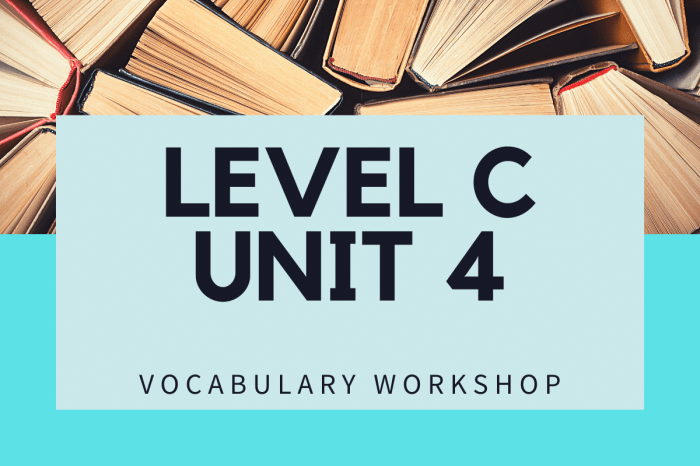Embark on a linguistic adventure with Vocab Workshop Level C Unit 9! This comprehensive guide unlocks a treasure trove of new words and strategies, empowering you to express yourself with precision and flair.
Prepare to delve into the intricacies of word structure, unravel the mysteries of word relationships, and master the art of using context to unlock the meaning of unfamiliar terms. With engaging activities and practical applications, this workshop will transform your vocabulary and elevate your writing to new heights.
Vocabulary Expansion: Vocab Workshop Level C Unit 9

Unit 9 expands your vocabulary by introducing a range of new words related to various topics, including the environment, technology, and social issues.
Strategies for Enhancing Vocabulary Acquisition
This unit employs several strategies to enhance vocabulary acquisition:
- Contextualization:New words are introduced in meaningful contexts, helping you understand their usage and meaning.
- Repetition and Review:Words are repeated and reviewed throughout the unit, reinforcing their memory.
- Word Study:You will analyze word parts, such as prefixes and suffixes, to derive meaning and build connections between words.
- Active Recall:Exercises encourage you to actively recall and use new words in different contexts.
Word Analysis and Word Relationships
Understanding the structure and relationships between words is crucial for expanding your vocabulary. By analyzing prefixes, suffixes, and root words, you can uncover the meaning and origin of new words. Exploring semantic relationships like synonyms, antonyms, and homonyms enhances your comprehension and communication skills.
Morphological Structure of Words, Vocab workshop level c unit 9
Words are composed of morphemes, the smallest units of meaning. Prefixes and suffixes are morphemes added to the beginning or end of a word, respectively, to modify its meaning. Root words carry the core meaning and can stand alone as complete words.
For example, the word “unhappy” is composed of the prefix “un-” (not), the root word “happy,” and the suffix “-y” (state of being).
Semantic Relationships Between Words
- Synonyms:Words with the same or similar meaning (e.g., happy and joyful)
- Antonyms:Words with opposite meanings (e.g., happy and sad)
- Homonyms:Words that have the same spelling or pronunciation but different meanings (e.g., bank (financial institution) and bank (side of a river))
Building Word Families and Understanding Word Origins
Understanding word families (groups of words with a common root) helps you expand your vocabulary and deepen your understanding of word origins. Etymology, the study of word origins, provides insights into the historical development and cultural influences on language.
By analyzing word structure and relationships, you can decode new words, enhance your comprehension, and communicate more effectively.
Contextual Understanding

Contextual understanding is the ability to comprehend the meaning of words and phrases within the context in which they are used. It involves using clues from the surrounding text to infer the meaning of unfamiliar words.
Vocabulary development is essential for improving reading comprehension. When learners have a strong vocabulary, they are better able to understand the meaning of texts and make inferences based on context.
Strategies for Improving Reading Comprehension through Vocabulary Development
- Read widely:The more learners read, the more words they will encounter and learn. Encourage learners to read a variety of texts, including newspapers, magazines, books, and online articles.
- Use context clues:When learners encounter an unfamiliar word, encourage them to look at the surrounding text for clues to its meaning. Context clues can include synonyms, antonyms, definitions, examples, and comparisons.
- Use a dictionary or thesaurus:If learners are unable to determine the meaning of a word from context, they should use a dictionary or thesaurus to look it up. This will help them to understand the word’s meaning and usage.
- Discuss vocabulary with others:Talking about new words with classmates, teachers, or family members can help learners to better understand and remember their meanings.
Writing Applications
In this section, we will delve into the practical applications of the vocabulary learned in Unit 9. We will explore how these words can elevate your writing, making it more precise, clear, and impactful. By mastering the vocabulary and incorporating it effectively, you will gain the ability to express your ideas with greater clarity and precision, enhancing your writing style and conveying your thoughts with confidence.
Enhancing Sentence Structure
The vocabulary of Unit 9 provides a wealth of words that can enrich your sentence structure. By incorporating these words, you can create sentences that are more complex, varied, and engaging. For instance, instead of using the simple verb “said,” you could use more nuanced verbs like “articulated,” “declared,” or “asserted.”
This variation in verb choice adds depth and interest to your writing, making it more enjoyable for the reader to engage with.
Improving Clarity and Precision
The precise vocabulary of Unit 9 allows you to convey your ideas with greater clarity and precision. By using specific and appropriate words, you can avoid ambiguity and ensure that your message is understood exactly as intended. For example, instead of using the general term “good,” you could use more specific adjectives like “excellent,” “outstanding,” or “commendable.”
This specificity helps the reader grasp the exact level of quality you are describing, leaving no room for misinterpretation.
Vocab Workshop Level C Unit 9 delves into the nuances of language, helping you master essential vocabulary for effective communication. Expanding your vocabulary is akin to unwrapping a priceless gift, revealing new ways to express yourself. Speaking of gifts, if you’re curious about the literary classic “The Gift of the Magi,” you can find answers and insights at the gift of the magi answers . By exploring diverse vocabulary and delving into literary masterpieces, Vocab Workshop Level C Unit 9 empowers you to communicate with clarity and impact.
Developing a Distinct Writing Style
The vocabulary of Unit 9 empowers you to develop a writing style that is uniquely your own. By incorporating these words into your writing, you can create a voice that is both distinctive and authoritative. The use of sophisticated vocabulary demonstrates your command of the language and adds a touch of elegance to your writing.
By mastering the vocabulary of Unit 9, you will gain the confidence to express yourself with clarity, precision, and style, leaving a lasting impression on your readers.
Vocabulary Practice Activities

Engaging learners in vocabulary acquisition is crucial for effective vocabulary learning. To reinforce vocabulary understanding, interactive exercises and activities are essential.
These activities provide opportunities for learners to practice using vocabulary in meaningful contexts, making the learning process more engaging and effective.
Games and Puzzles
- Crosswords and Word Searches:These classic games challenge learners to find and match words, reinforcing spelling and vocabulary recognition.
- Word Jumbles and Anagrams:These puzzles require learners to unscramble letters to form words, improving their word formation skills and vocabulary knowledge.
- Hangman:This game encourages learners to guess words one letter at a time, enhancing their vocabulary and spelling skills.
Simulations and Role-Playing
- Storytelling and Skits:Learners create stories or act out scenarios using the target vocabulary, improving their comprehension and application skills.
- Mock Interviews and Presentations:These simulations provide learners with opportunities to use vocabulary in professional settings, enhancing their communication and confidence.
- Vocabulary Charades:This game encourages learners to act out words or phrases using gestures, fostering their understanding and retention.
Contextual Practice
- Cloze Exercises:Learners fill in missing words in sentences or texts, improving their comprehension and vocabulary usage.
- Sentence Completion:Learners complete sentences using the target vocabulary, reinforcing their understanding and ability to use words in context.
- Guided Writing:Learners write short stories or essays using the target vocabulary, enhancing their vocabulary application and writing skills.
Popular Questions
What is the primary focus of Vocab Workshop Level C Unit 9?
Expanding vocabulary and enhancing word usage through analysis, context, and practical applications.
How does the workshop approach vocabulary acquisition?
Through a combination of word analysis, contextual understanding, and interactive exercises.
What types of writing tasks are covered in the workshop?
Various writing tasks that demonstrate the effective use of vocabulary to enhance clarity, precision, and sentence structure.